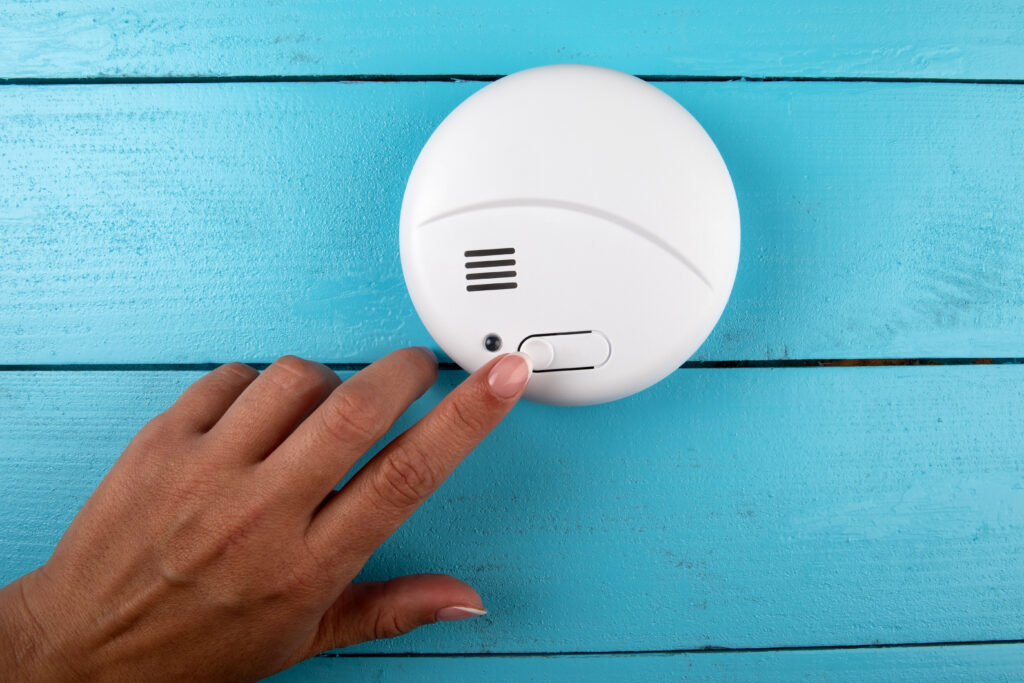The smoke and Carbon Monoxide Alarm (England) Regulations 2015 came into effect in England on the first of October 2015. Under these regulations, Landlords must install a smoke alarm on every floor of a property where there is a room which is used solely or partly as living accommodation, this includes bathrooms and kitchens. The law also requires a carbon monoxide alarm to be installed in any room where solid fuel such as wood or coal is burnt.

These laws are being amended and on the 1st of October 2022 the Smoke and Carbon Monoxide Alarm (Amendment) Regulations 2022 will come into force. These new regulations will extend the requirements of Landlords as far as Smoke and Carbon Monoxide alarms are concerned, so what are the differences?
- The requirement to provide a smoke alarm on every floor where there is space used wholly or partly as living accommodation remains in force
- Landlords will now have to install a carbon monoxide alarm in every room which contains a fixed combustion appliance (excluding gas cookers). This is a new requirement as it now covers any appliance that burns solid fuel (Wood, coal, biomass) and also any appliance that burns gas or LPG. This now means that items such as gas fired boilers and gas fires are covered under the regulations. This was not the case previously
- Landlords are responsible for repairing or changing faulty alarms. If a tenant raises an issue with the landlord, even if it is just that the batteries need replacing, the landlord has to ensure that the alarm is sorted, although it is always advisable for the tenant to simply switch the batteries themselves.
- Landlords must prove that all alarms were in full working order on the day that any new tenancy starts, it is advisable to log this on the check in document.
Whilst there is no defined type of alarm to install, it is advisable that any smoke alarm conforms to BS5839-6 and that any Carbon dioxide alarm conforms to BS 50291, this is, however, not a legal requirement.
The Regulations do not apply to all tenancies, though and there are some that are excluded:
- shared accommodation with a landlord or landlord’s family
- long leases
- student halls of residence
- hotels and refuges
- care homes
- hospitals and hospices
- low cost ownership homes
- other accommodation relating to health care provision
It is advisable that a landlord checks carefully to see if their rental property is excluded. If it isn’t then they will need to comply with the law. Non-compliance can lead to enforcement action and the fine for non-compliance with this action can be up to £5,000 per breach. Compliance will be mandatory from the 1st of October 2022.
These new regulations add an extra burden of responsibility on landlords. There is time before the regulations come into force to get your property up-to-scratch so it would be advisable for landlord’s to check the new laws carefully and ensure that they comply.
These laws are being amended and on the 1st of October 2022 the Smoke and Carbon Monoxide Alarm (Amendment) Regulations 2022 will come into force. These new regulations will extend the requirements of Landlords as far as Smoke and Carbon Monoxide alarms are concerned, so what are the differences?
- The requirement to provide a smoke alarm on every floor where there is space used wholly or partly as living accommodation remains in force
- Landlords will now have to install a carbon monoxide alarm in every room which contains a fixed combustion appliance (excluding gas cookers). This is a new requirement as it now covers any appliance that burns solid fuel (Wood, coal, biomass) and also any appliance that burns gas or LPG. This now means that items such as gas fired boilers and gas fires are covered under the regulations. This was not the case previously
- Landlords are responsible for repairing or changing faulty alarms. If a tenant raises an issue with the landlord, even if it is just that the batteries need replacing, the landlord has to ensure that the alarm is sorted, although it is always advisable for the tenant to simply switch the batteries themselves.
- Landlords must prove that all alarms were in full working order on the day that any new tenancy starts, it is advisable to log this on the check in document.
Whilst there is no defined type of alarm to install, it is advisable that any smoke alarm conforms to BS5839-6 and that any Carbon dioxide alarm conforms to BS 50291, this is, however, not a legal requirement.
The Regulations do not apply to all tenancies, though and there are some that are excluded:
- shared accommodation with a landlord or landlord’s family
- long leases
- student halls of residence
- hotels and refuges
- care homes
- hospitals and hospices
- low cost ownership homes
- other accommodation relating to health care provision
It is advisable that a landlord checks carefully to see if their rental property is excluded. If it isn’t then they will need to comply with the law. Non-compliance can lead to enforcement action and the fine for non-compliance with this action can be up to £5,000 per breach. Compliance will be mandatory from the 1st of October 2022.
These new regulations add an extra burden of responsibility on landlords. There is time before the regulations come into force to get your property up-to-scratch so it would be advisable for landlord’s to check the new laws carefully and ensure that they comply.





